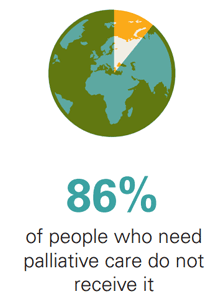 5 November 2015 -- Every year, 40 million people need palliative care worldwide and, 86% do not receive it. Palliative care is the care given to patients and their families who are facing problems associated with life-threatening illness, whether physical, psychosocial or spiritual. It is an approach that improves the quality of life through prevention and relief of suffering by means of early identification and impeccable assessment and treatment of pain and other problems, physical, psychosocial and spiritual.
5 November 2015 -- Every year, 40 million people need palliative care worldwide and, 86% do not receive it. Palliative care is the care given to patients and their families who are facing problems associated with life-threatening illness, whether physical, psychosocial or spiritual. It is an approach that improves the quality of life through prevention and relief of suffering by means of early identification and impeccable assessment and treatment of pain and other problems, physical, psychosocial and spiritual.
Palliative care can be given in homes, health centers, hospitals and hospices. Also, it can be done by many types of health professionals and volunteers. Providing and increasing access to palliative care:
benefits health systems by reducing unnecessary hospital admissions
relieves physical, psychosocial and spiritual suffering
improves quality of life
Countries have an obligation to identify and overcome barriers to palliative care at national level. Countries can:
revise laws and processes to improve access
include palliative care in the training for workers
provide palliative care services in primary health care centers and at home
View infographic on Improving access to palliative care


